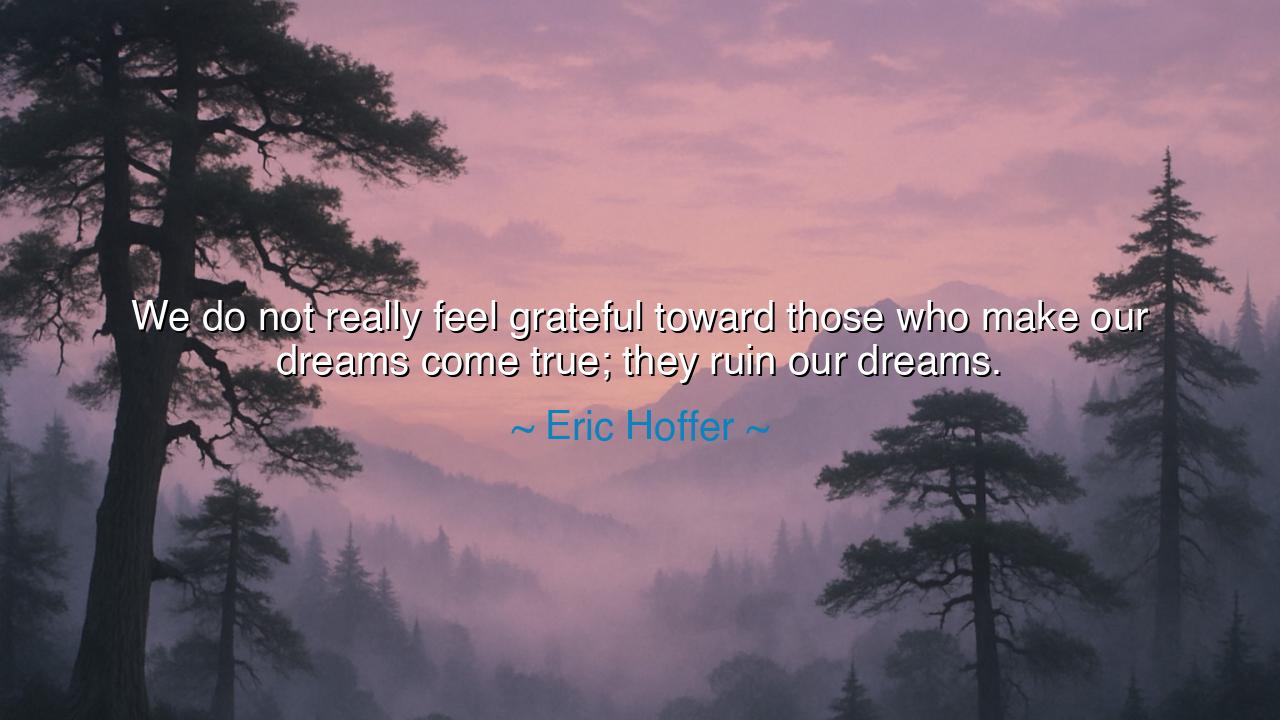
We do not really feel grateful toward those who make our dreams
We do not really feel grateful toward those who make our dreams come true; they ruin our dreams.






The words of Eric Hoffer, “We do not really feel grateful toward those who make our dreams come true; they ruin our dreams,” pierce the heart with a paradox as old as desire itself. Beneath their quiet simplicity lies a profound reflection on the human spirit—the strange, restless quality of our nature that loves the chase more than the capture, the dream more than the fulfillment. Hoffer, the longshoreman philosopher who gazed upon the toils of ordinary men and found in them the truths of eternity, understood that dreams are not merely goals—they are sacred fires that give meaning to the long night of effort. To realize them is both victory and loss, for once a dream becomes real, it ceases to be a dream.
In these words, Hoffer unveils one of the hidden tragedies of achievement: that the moment of fulfillment often brings with it a quiet death. Dreams live in the realm of possibility—they are the pure light of what could be. When we finally grasp them, we drag them into the imperfect world of reality, where they lose their mystery and glow. The heart, which once burned with longing, now faces an emptiness it cannot name. The one who helps us achieve this dream—though they may have labored in kindness—is often met not with gratitude, but with resentment. For by giving us what we sought, they expose the truth we did not wish to face: that it was the pursuit, not the possession, that gave us purpose.
This is not cynicism; it is wisdom. The ancients knew it well. When Alexander the Great had conquered all he desired, when no more worlds remained to subdue, he wept—not for the lands he had won, but for the dreams that could no longer sustain him. The fire that had driven him across deserts and oceans now flickered without fuel. His generals, who had followed him to the ends of the earth, could no longer give him the one thing he truly craved: the glory of the unattainable. So too do we, in our smaller ways, live and die by our longings. We call it ambition, love, discovery—but always it is the same: once the horizon is reached, the sky feels smaller.
Thus, when Hoffer says that those who make our dreams come true “ruin” them, he speaks not in condemnation, but in revelation. He reminds us that human beings are born not only to achieve, but to yearn. The dream fulfilled is like the fruit plucked too early—it loses its fragrance and sweetness. The one who grants it, though noble in intent, robs us of our inner fire. That is why gratitude is difficult: not because we are unkind, but because part of us mourns what has been lost. The gift of realization is always double-edged—it frees us from longing, but it also takes away the beauty of the longing itself.
Yet Hoffer’s truth is not a counsel of despair—it is a call to wisdom. The wise soul learns to live not for the final dream, but for the art of dreaming itself. The journey, not the arrival, must be our teacher. Those who understand this walk in peace; they cherish their achievements but do not cling to them. They find renewal by dreaming anew, by setting their hearts once more upon horizons untraveled. For life, in its deepest rhythm, is a series of births and endings, and each fulfilled dream is but the seed of another. The wise do not curse the loss of the old flame—they use it to kindle the next.
There are those in every age who live by this principle. Consider Thomas Edison, who after thousands of experiments finally created the electric light. When asked how he endured so many failures, he answered, “I have not failed—I’ve found ten thousand ways that won’t work.” His joy was not in the final glow of the bulb, but in the endless striving that led him there. The light was not the prize; the journey was. In this way, Edison avoided the fate Hoffer warned of—he did not let achievement extinguish his spirit of discovery. He kept dreaming, kept failing, kept creating. And so he lived not by the death of dreams, but by their continual rebirth.
From Hoffer’s reflection, let us take this enduring lesson: never allow fulfillment to silence your longing. When one dream is achieved, do not fall into emptiness—plant another, and another still. Be grateful not for the end of striving, but for the capacity to strive. And when others help you realize what you once imagined, honor them not merely for their aid, but for reminding you that even realized dreams are but stepping stones toward deeper vision.
For this is the great secret of the human heart: we are creatures of eternal becoming. Our joy is not in the stillness of completion, but in the motion of pursuit. So live as the ancients taught—grateful for what you attain, yet ever open to what remains beyond. Dream again, and again, until your final breath. For the dream, not the victory, is the true light of life—and to lose that dream is to lose the very spark that makes us human.






AAdministratorAdministrator
Welcome, honored guests. Please leave a comment, we will respond soon